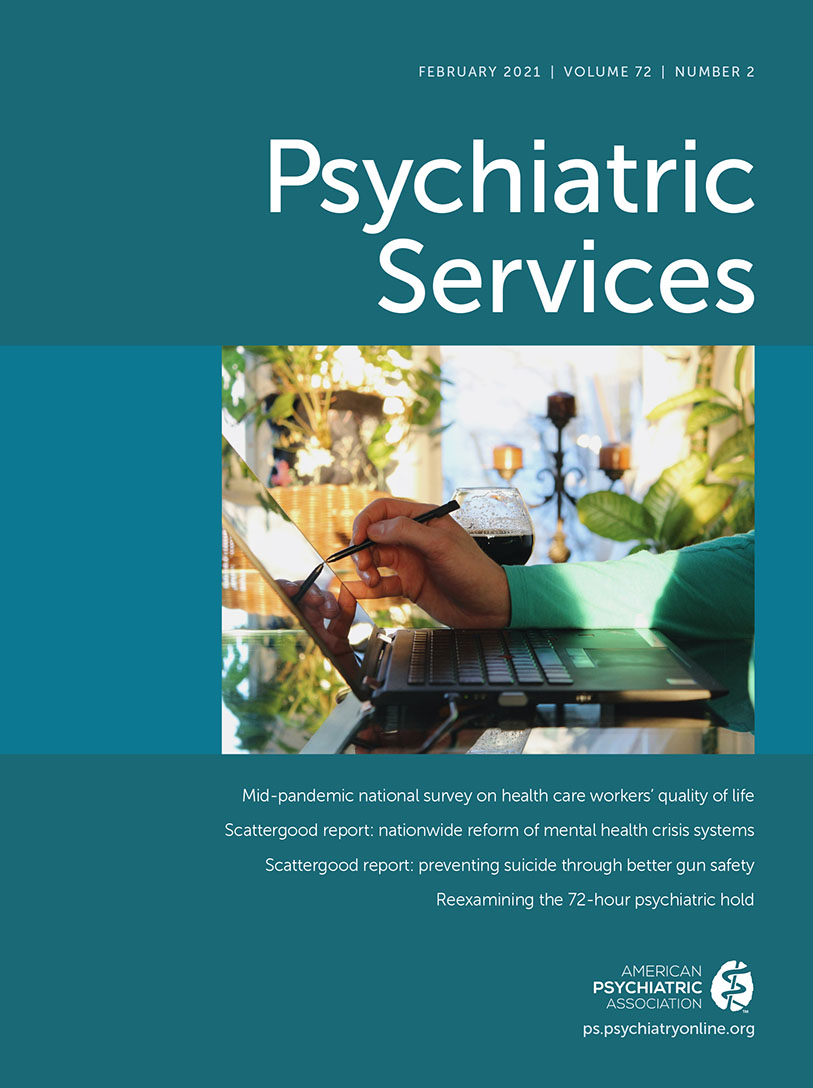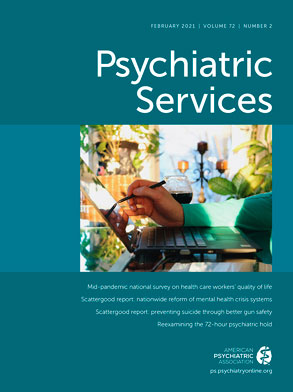TO THE EDITOR: Behavioral urgent care centers (BUCCs) have arisen in the past few years to provide rapid access to assessment and short-term mental health treatment (
1). We examined the prevalence, characteristics, and uptake of telepsychiatry at BUCCs in the United States.
BUCCs are walk-in clinics specializing in psychological issues and sited within ambulatory medical facilities outside of freestanding emergency departments. Searching the Internet, we identified 77 BUCCs in the 50 U.S. states. In August 2020, a trained investigator posing as a new, uninsured patient used a standardized script (see online supplement) to ask BUCC receptionists about services, wait times, telehealth for new patients, and cost. Twelve facilities were not walk-in clinics (i.e., appointment only) and were excluded. Median household income in each BUCC’s zip code was retrieved from the 2018 American Community Survey. This study was exempted from institutional review board approval.
We present data from 65 BUCCs in 31 states. Most BUCCs (91%, N=59) accepted Medicaid, and 94% (N=61) accepted uninsured patients. Twenty-nine percent (N=19 of 65 BUCCs) did not require payment from patients without insurance, and 62% (N=18 of 29 BUCCs) offered sliding-scale and other discounts. Of the BUCCs that required payment, the average cost for an initial visit was $203.
Most BUCCs (74%, N=48) were unaffiliated with a hospital. Wait times were reported by 51 BUCCs and ranged from none (26%, N=13), to under one hour (12%, N=6), one hour or more (43%, N=22), or fluctuating (20%, N=10). Initial visits were with a nurse (29%, N=33), therapist/counselor (21%, N=24), social worker (17%, N=19), general doctor (16%, N=18), psychiatrist (11%, N=11), physician assistant (4%, N=4), or peer specialist (3%, N=3).
BUCCs tended to be sited in higher-income regions relative to the state in which they were located (lowest quintile=1%, second quintile=17%, third quintile=52%, fourth quintile=25%, highest quintile=5%). This could restrict access for individuals living in lower-income regions. However, telepsychiatry for new patients was available at over half of BUCCs contacted (54%, N=35), which may bridge this barrier of physical access to care.
The rise of BUCCs was driven by a necessity to provide adequate mental health care, especially to those who cannot afford it otherwise. Many of the services are designed to reach patients with public or no insurance. BUCCs that work on behalf of state, county, or city governments are legislated to receive funding from these stakeholders, which allows them to offer free appointments or fee assistance (
2,
3). Other BUCCs are primarily for-profit models independently operated by medical professionals (
4).
During the current COVID-19 pandemic, when many individuals are experiencing increased mental health concerns, BUCCs may offer timely mental health care in person and via telepsychiatry. Because these specialized clinics can also provide services to patients in crisis, this new format of care may prevent the overcrowding of emergency departments, reduce the use of mobile crisis teams, and shorten wait times for outpatient care (
5).
Limitations include the small number of BUCCs that exist, although to our knowledge all BUCCs that are available to the general public were contacted. This survey did not include psychiatric emergency clinics operated by the Veterans Health Administration.
Future research should examine changes in the prevalence of BUCCs and effects on accessibility, quality of care, and clinical outcomes as compared with traditional emergency care.

